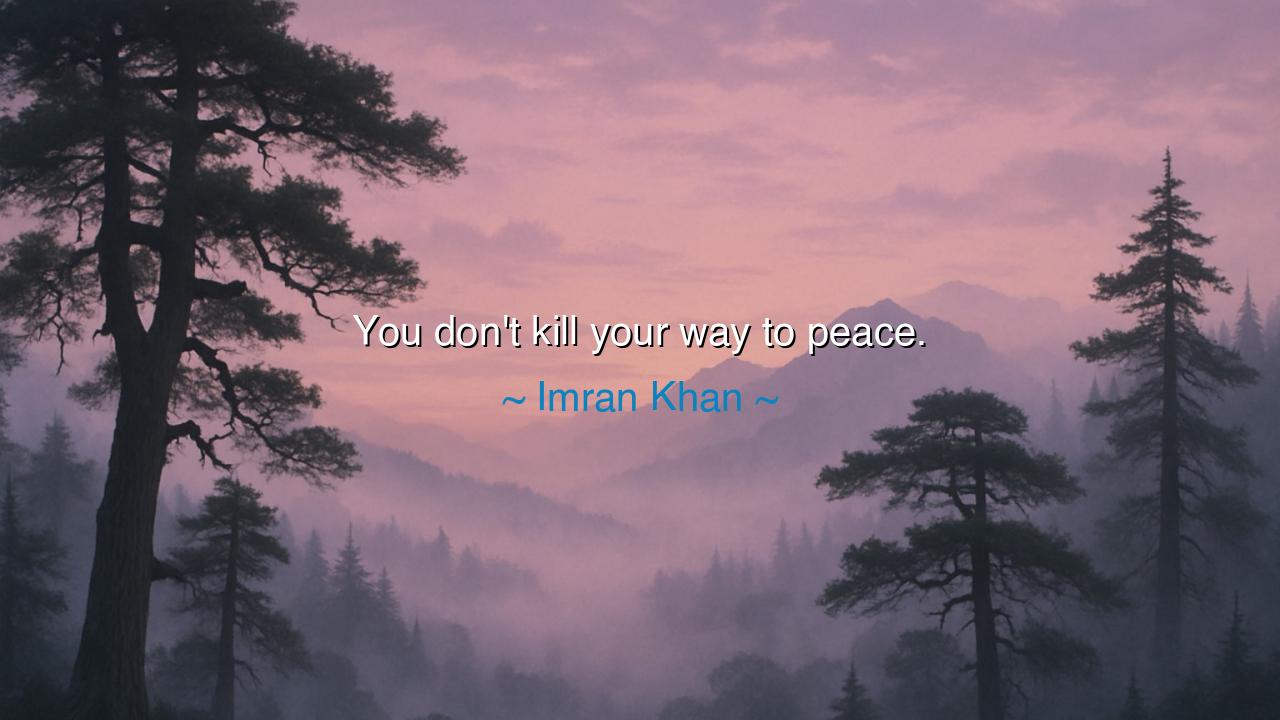
You don't kill your way to peace.






“You don't kill your way to peace.” So declared Imran Khan, a statesman who saw his land torn by strife, his people caught between the cries of vengeance and the yearning for calm. His words pierce like an arrow through the illusions of war, striking at a truth mankind has long forgotten. For many believe that by wielding the sword, by destroying the enemy, by silencing the other through death, they will win peace. Yet history, carved in blood upon the stones of time, teaches otherwise: peace cannot be harvested from the soil of violence. Where death reigns, silence may follow, but silence is not peace.
The ancients themselves grappled with this. Rome, the eternal empire, declared the phrase pax Romana, the peace of Rome. Yet this “peace” was wrought through legions, through crucifixions, through rivers of blood. It endured not as harmony, but as submission—nations bowed beneath the sword, not lifted into brotherhood. And when Rome’s strength waned, that peace shattered, for it had been built on fear, not on justice. Here lies the meaning of Khan’s words: to kill is to rule for a time, but to reconcile is to heal for eternity.
Consider too the story of Mahatma Gandhi, who faced the vast empire of Britain not with muskets but with the weapon of the spirit: nonviolence. He refused to return hatred with hatred, blow with blow. His struggle revealed a deeper power, one that shook an empire without firing a shot. In this he proved the ancient principle that true peace is born not from annihilation but from restraint, compassion, and moral strength. Where armies failed, a frail man in homespun cloth triumphed. His legacy cries out to the generations: peace is never purchased by killing, but by courage greater than violence itself.
And yet, still in our age, the cycle repeats. Nations bomb in the name of security, rebels slaughter in the name of freedom, rulers command death in the name of order. But each death sows the seeds of more rage, more vengeance, more war. The slain father leaves behind a son who burns with hatred; the fallen soldier leaves behind a mother who cries for retribution. Thus, the river of blood flows endlessly, while the shore of peace recedes ever farther. Imran Khan’s words are a reminder, a call to awaken from this tragic cycle: killing is a road that winds forever in circles, never reaching the destination it promises.
The lesson for us is not merely for nations, but for the soul of every man and woman. For even in our homes, in our hearts, do we not sometimes try to “kill” our way to peace? We seek to destroy our rivals with words, to crush those who offend us, to silence dissent by force. But does this not breed bitterness, division, and greater unrest? True peace in families, in friendships, in communities, is won not by conquest but by understanding, forgiveness, and dialogue. What is true on the battlefield is true also at the table: violence multiplies unrest, while compassion multiplies harmony.
Practical wisdom must follow. When you are wronged, resist the urge to strike back with equal fire. Instead, pause, breathe, and ask: “What will bring true peace—victory or reconciliation?” In disputes, strive first for dialogue. When anger flares, choose patience. When hatred tempts, choose empathy. And if you must fight, let it be against ignorance, injustice, and cruelty—not against the flesh of your brother or sister. By practicing these small acts, you take up the eternal labor of peace, the only labor that builds and does not destroy.
Thus, Imran Khan’s words stand as both warning and promise. You don’t kill your way to peace—for death breeds only death, and the sword sharpens itself upon endless stone. But to seek peace through mercy, to pursue harmony through justice, to sow seeds of reconciliation even in soil soaked with bitterness—this is the labor that leads to true and lasting peace. And so I say to you: lay down the sword of vengeance, and take up the staff of understanding. For only then shall peace dwell not as a fleeting shadow, but as an eternal light.






AAdministratorAdministrator
Welcome, honored guests. Please leave a comment, we will respond soon